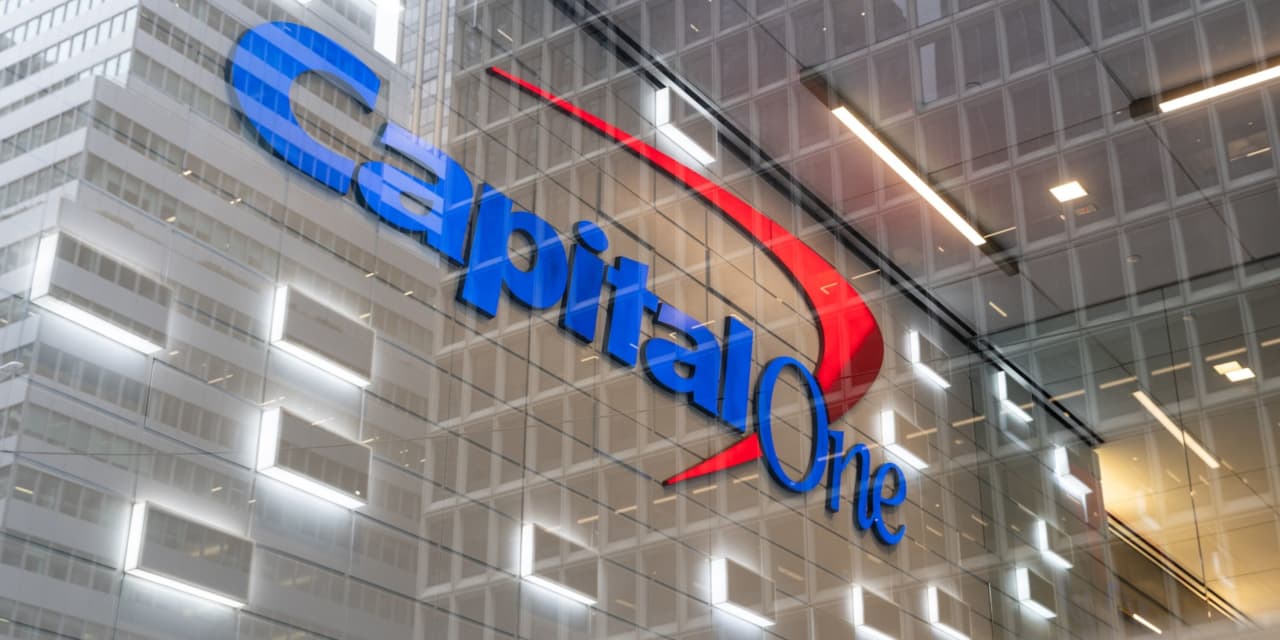Antitrust regulators will likely have concerns about one of the country’s largest card issuers buying one of its largest payments networks. But whether the deal can pass regulatory muster could boil down to who’s in the White House at the end of next January.
Capital One
agreed to buy
Discover Financial
in a $35 billion, all-stock deal that would pit the new financial giant against payments networks
Visa
and
Mastercard.
The deal is expected to close late this year or early next year.
The merger will no doubt face scrutiny from banking and antitrust regulators, which under President Joe Biden have been laser focused on anything that would dampen competition in the payments industry.
Some consumer advocates will likely have concerns with a large card issuer combining with a large card network. Both
American Express
and Discover already combine the issuer and network functions, which lets them keep a larger cut of the revenue earned through their cards.
But the Discover deal would bring that vertical integration to a new height. When combined, the companies would create the largest consumer card issuer by loans outstanding, according to Bank of America Global Research.
“The
Capital One
-Discover deal will create another colossal too-big-to-fail bank while supercharging consolidation in the credit card sector,” said Shahid Naeem, senior policy analyst at the American Economic Liberties Project in a statement. The nonprofit advocates for aggressive antitrust enforcement.
National Community Reinvestment Coalition CEO Jesse Van Tol in a statement said the deal “poses massive antitrust concerns, given the vertical integration of Capital One’s credit card lending with Discover’s credit card network.”
BTIG director of policy research Isaac Boltansky said he can’t think of a precedent for such a merger.
“Every part of the transaction will be scrutinized,” Boltansky said. “This deal is going to take a considerable amount of time, bandwidth, and billable hours.”
The first complication is that an inordinate number of agencies and lawmakers have the chance to stop, or at least slow down, a combination in the banking industry. The deal would have to be approved by the Federal Reserve and the Office of the Comptroller of the Currency.
In addition, the Department of Justice’s antitrust division could raise anticompetitive concerns, while the Consumer Financial Protection Bureau could sound the alarm over how the combination could affect consumer costs.
The Justice Department didn’t immediately respond to a request for comment. A Federal Reserve Board spokesperson declined to comment.
One factor in the deal’s favor is that the combined entity could be a more powerful rival to
Visa
and
Mastercard.
Senate Majority Whip Dick Durbin (D., Ill.) and other lawmakers have tried to push forward a bill that would force credit-card issuing banks to offer a choice of at least two payments networks, one of which can’t be Visa or Mastercard, to process transactions. The idea is that greater competition would force the networks to lower fees.
Some lawmakers might view such a bill as less necessary if Discover becomes more powerful, but the debate could shift to whether Capital One should be forced to allow other banks to issue cards on the Discover network.
“This could be a way for Capital One to sell the deal to Congress by promising it could become a real price constraint on Visa and MasterCard by opening Discover to other issuers,” said TD Cowen analyst Jaret Seiberg in a research note on Tuesday.
Already some progressive lawmakers said they opposed the deal.
“This Wall street deal is dangerous and will harm working people,” said Sen. Elizabeth Warren (D., Mass.) in a post on X. Warren said the deal would reduce competition, raise costs, and threaten financial stability.
Senate Banking Chairman Sherrod Brown (D., Ohio) said he would seek to ensure the merger “doesn’t enrich shareholders and executives at the expense of consumers and small businesses.”
Capital One and Discover didn’t immediately respond to requests for comment.
On a call with analysts Tuesday morning announcing the deal, Capital One CEO Richard Fairbank said the bank had kept regulators apprised during the process of putting the deal together but couldn’t discuss their conversations.
“We believe that we are well-positioned for approval,” Fairbank said.
Though the Biden administration could indicate this year that it plans to challenge the deal, any potential lawsuit or regulatory action would likely bleed into 2025, meaning the next administration, whether Biden, Trump, or another challenger, will have the final say on moving forward.
The deal “could be added to the list of names viewed as possible beneficiaries of a Republican White House next year,” said Boltansky in a research note.
Write to Joe Light at [email protected]
Read the full article here




